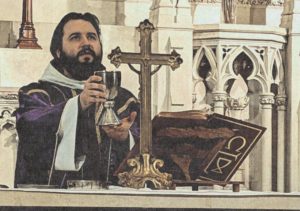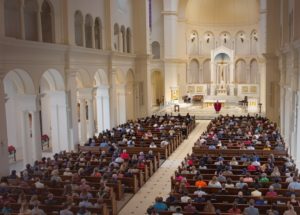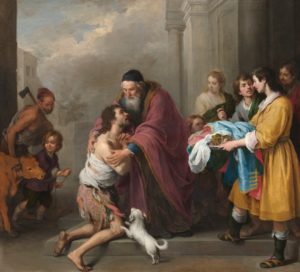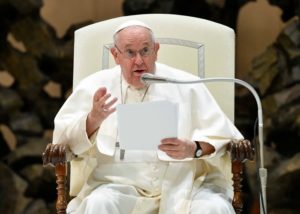 Wisdom & Encouragement
Wisdom & Encouragement
This week, members of the National Eucharistic Congress team had the privilege of an audience with Pope Francis in Rome. The Holy Father expressed his support for the rebirth of the Congress legacy in the United States and the Revival movement as a whole.
Pope Francis affirmed the critical need for Eucharistic Revival, and share his hope for the future of the Church in the United States. He says the Congress will be an occasion for the faithful to 'commit themselves with even greater zeal to being missionary disciples of the Lord Jesus in the world."
This connection between the Eucharist and mission cannot be ignored. The Holy Father reminded us that “the love we celebrate in this sacrament cannot be kept to ourselves but demands to be shared with all. This is the sense of a missionary spirit.” The pope went on to say, “Two groups of people come to mind whom we must always seek out: the elderly, who are the wisdom of a people, and the sick, who are the image of the suffering Jesus.”
He especially stressed the importance of fostering vocations to the priesthood, as “There can be no Eucharist without the priesthood” (Pope John Paul II’s Letter to Priests for Holy Thursday 2004).
Read the full address below:
Your Excellencies,
Dear brothers and sisters, good morning and welcome!
I am pleased to offer a cordial welcome to all of you, the members of the Committee preparing for the forthcoming National Eucharistic Congress in the United States of America. I thank you for the work you have already undertaken and I encourage you to continue your efforts to contribute to a revival of faith in, and love for, the Holy Eucharist, the “source and summit of the Christian life” (Lumen Gentium, 11).
All of us are familiar with the account of the multiplication of the loaves recorded in the Gospel of John. The people who witnessed this miracle came back to the Lord on the following day in hopes of seeing him perform another sign. Yet Christ desired to transform their hunger for material bread into a hunger for the bread of eternal life (cf. Jn 6:26-27). For this reason, Jesus spoke of himself as the living bread which came down from heaven, the true bread that gives life to the world (cf. Jn 6:51). I thought a great deal about this while I was celebrating Mass this morning because it is this bread that gives us life. Indeed, the Eucharist is God’s response to the deepest hunger of the human heart, the hunger for authentic life, for in the Eucharist Christ himself is truly in our midst, to nourish, console and sustain us on our journey. Sadly nowadays, there are those among the Catholic faithful who believe that the Eucharist is more a symbol than the reality of the Lord’s presence and love. It is more than a symbol; it is the real and loving presence of the Lord. It is my hope, then, that the Eucharistic Congress will inspire Catholics throughout the country to discover anew the sense of wonder and awe at the Lord’s great gift of himself and to spend time with him in the celebration of the Holy Mass and in personal prayer and adoration before the Blessed Sacrament. I believe that we have lost the sense of adoration in our day. We must rediscover the sense of adoration in silence. It is a form of prayer that we have lost. Too few people know what it is. It is up to the Bishops to catechize the faithful about praying through adoration. The Eucharist requires it of us. In this regard, I cannot fail to mention the need for fostering vocations to the priesthood, for as Saint John Paul II said, “There can be no Eucharist without the priesthood” (Letter to Priests for Holy Thursday 2004). We need priests to celebrate the Holy Eucharist.
I likewise trust that the Congress will be an occasion for the faithful to commit themselves with ever greater zeal to being missionary disciples of the Lord Jesus in the world. In the Eucharist, we encounter the One who gave everything for us, who sacrificed himself in order to give us life, who loved us to the end. We become credible witnesses to the joy and transforming beauty of the Gospel only when we recognize that the love we celebrate in this sacrament cannot be kept to ourselves but demands to be shared with all. This is the sense of a missionary spirit. You go to the celebration of Mass, receive communion, adore the Lord and then what do you do after? You go out and evangelize. Jesus asks this of us. The Eucharist, then, impels us to a strong and committed love of neighbor. For we cannot truly understand or live the meaning of the Eucharist if our hearts are closed to our brothers and sisters, especially those who are poor, suffering, weary or who may have gone astray in life. Two groups of people come to mind whom we must always seek out: the elderly, who are the wisdom of a people, and the sick, who are the image of the suffering Jesus.
Dear friends, the National Eucharistic Congress marks a significant moment in the life of the Church in the United States. May all that you are doing be an occasion of grace for each of you and may it bear fruit in guiding men and women throughout your nation to the Lord who, by his presence among us, rekindles hope and renews life. Entrusting you to the maternal intercession of Mary Immaculate, Patroness of your country, I assure you of my prayers for you, your families and your local Churches. To all of you, I impart my blessing, and I ask you, please, to remember to pray for me. Thank you.
[01008-EN.02] [Original text: Italian]

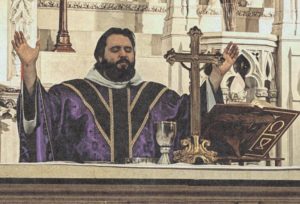 Welcome to Beautiful Light, a liturgical catechesis rooted in the Church’s mystagogical tradition. Mystagogy is an ancient form of catechesis that helps us go deeper into the mysteries we celebrate in the sacraments. Every week a new theme will help you focus on the graces available to you through the Mass as you prayerfully reflect on the content.
Welcome to Beautiful Light, a liturgical catechesis rooted in the Church’s mystagogical tradition. Mystagogy is an ancient form of catechesis that helps us go deeper into the mysteries we celebrate in the sacraments. Every week a new theme will help you focus on the graces available to you through the Mass as you prayerfully reflect on the content.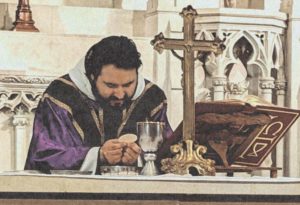 Welcome to Beautiful Light, a liturgical catechesis rooted in the Church’s mystagogical tradition. Mystagogy is an ancient form of catechesis that helps us go deeper into the mysteries we celebrate in the sacraments. Every week a new theme will help you focus on the graces available to you through the Mass as you prayerfully reflect on the content.
Welcome to Beautiful Light, a liturgical catechesis rooted in the Church’s mystagogical tradition. Mystagogy is an ancient form of catechesis that helps us go deeper into the mysteries we celebrate in the sacraments. Every week a new theme will help you focus on the graces available to you through the Mass as you prayerfully reflect on the content. Welcome to Beautiful Light, a liturgical catechesis rooted in the Church’s mystagogical tradition. Mystagogy is an ancient form of catechesis that helps us go deeper into the mysteries we celebrate in the sacraments. Every week a new theme will help you focus on the graces available to you through the Mass as you prayerfully reflect on the content.
Welcome to Beautiful Light, a liturgical catechesis rooted in the Church’s mystagogical tradition. Mystagogy is an ancient form of catechesis that helps us go deeper into the mysteries we celebrate in the sacraments. Every week a new theme will help you focus on the graces available to you through the Mass as you prayerfully reflect on the content.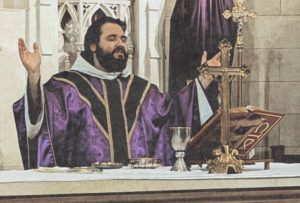 Welcome to Beautiful Light, a liturgical catechesis rooted in the Church’s mystagogical tradition. Mystagogy is an ancient form of catechesis that helps us go deeper into the mysteries we celebrate in the sacraments. Every week a new theme will help you focus on the graces available to you through the Mass as you prayerfully reflect on the content.
Welcome to Beautiful Light, a liturgical catechesis rooted in the Church’s mystagogical tradition. Mystagogy is an ancient form of catechesis that helps us go deeper into the mysteries we celebrate in the sacraments. Every week a new theme will help you focus on the graces available to you through the Mass as you prayerfully reflect on the content.